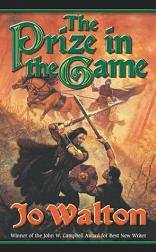
The Prize in the Game
Jo Walton
341 pages
published in 2002
I've known Jo Walton a long time, from before she became a succesful novelist, when she was "just" one of the most interesting posters in various Usenet groups like rec.arts.sf.written and Rec.arts.sf.fandom. You could therefore say I wanted this novel to be good. Fortunately, having read one of her earlier novels, The King's Peace, I knew it was very likely going to be. And I was right.
Which reminds me that The Prize in the Game is actually set in the same world as The King's Peace and functions as a sort of prequel to it, showing the background story of some of the secondary characters. You don't need to have read it to enjoy The Prize in the Game however; it completely stands on its own. The quickest way to describe The Prize in the Game is as a coming of age novel set in a fantasy version of Celtic Ireland, in which some of the viewpoint characters may not actually come of age. Be careful though to assume too much from this; the island of Tir Isarnagiri differs from the real or even mythological Ireland in important ways. No leprechauns here.
The story revolves around four friends: Conal, son of the poet Amagien and nephew to king Conary of Oriel, Elenn and Emer, daughters of the rulers of Connat, who are guesting at Oriel and Ferdia, best friend to Darag, Conal's main rival for the throne. Kings in Tir Isarnagiri are chosen by their subjects and hence need to do impressive things to be thought worthy of kingship. There's therefore somewhat of an informal contest going on all the time between Darag and Conal, which drives a lot of the plot of the first half of the novel. It's a somewhat episodic story, told through the succesive viewpoints of each of the four main characters, starting slow then speeding up in the last half of the book.
The telling is also somewhat abruptly; a quest is set up at one point, which you expect to be followed in some detail but instead is largely skipped over. This is less a flaw and more a deliberate choice to focus on how their adventures change the characters rather than the adventures themselves. The payoff comes in the final part of the book, when war breaks out between several of the kingdoms of Tir Isarnagiri and the friends find themselves on opposing sides, which leads to the essential tragedy of this story, in how they deal with this without abandoning their friendships.
What struck me was how Cherryh-esque The Prize in the Game felt like. As you may know, C. J. Cherryh is known for writing novels in which her protagonist, invariably young and alone, is put through the wringer: pushed beyond their limits with impossible tasks in hostile situations without knowning even a tenth of the things they should know if they're to survive. Jo Walton is less extreme, but especially in the later chapters Conal, Ferdia, Elenn and Emer are all faced with some hard choices they have to make on their own with no guarantee that others will even understand why they made them.
What also struck me was how subtle the use of magic in this novel was, until it wasn't. None of the usual fantasy magic cliches were used here. For the most part it could as well be a straight historical adventure set in some imagined Irish bronze or iron age, until you clue in that there is some magic going on in the background, but magic that is grounded in day to day life and isn't fussed about. Which makes the few times that something truly magical does happen that much more impressive, or scary, as it's clear that this magic is not under control.
The overall impression The Prize in the Game left me with is that of a novel that might actually have been too good, or at least too subtle, for its own succes. As Christopher Cobb in his Strange Horizons review complains: "because most of the major events of the novel are outside the control of its central characters, the plot lacks that smooth, unfolding suspense that makes the mass-market fantasy so difficult to put down". It may indeed be a bit of a stumbleblock for a reader who approaches this as just another epic fantasy, rather than the much more interesting novel this is. Perhaps the ideal reader for The Prize in the Game might be an intelligent twelve year old as yet unspoilt by reading too many more formulaic fantasies...
Read more about:
Jo Walton,
The Prize in the Game,
fantasy,
book review